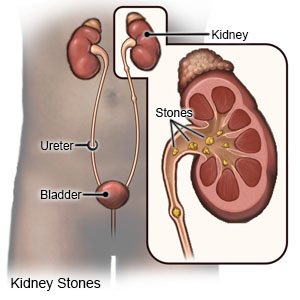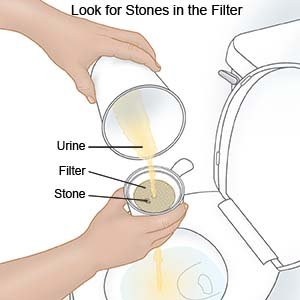Lithotripsy
Medically reviewed by Drugs.com. Last updated on Apr 6, 2025.
AMBULATORY CARE:
What you need to know about lithotripsy:
Lithotripsy is a procedure that uses sound waves to break up stones in the kidney, ureter, or bladder. The stone pieces then pass out of your body through your urine.
 |
How to prepare for lithotripsy:
- Your healthcare provider will tell you about how to prepare for the procedure. Your provider may tell you not to eat or drink anything after midnight before your procedure. Arrange to have someone drive you home after the procedure.
- You may need to stop taking any medicines that thin your blood 1 week or more before your procedure. These medicines include aspirin, ibuprofen, and anticoagulants.
- Your provider will tell you which medicines to take or not take on the day of your procedure.
What will happen during lithotripsy:
- You may be given medicine to keep you relaxed and pain-free during the procedure. You may instead be given general anesthesia to keep you asleep during the procedure.
- X-rays or an ultrasound are used to find the kidney stone. You may lie on a cushion filled with water or sit in a bath of warm water. High-energy sound waves are aimed at your kidney stone. The sound waves break the stone into tiny pieces. You will pass these pieces in a few days when you urinate.
- A stent (tube) may be put into your kidney or ureter through your bladder or back. The stent helps the pieces of stone pass out of your body.
What to expect after lithotripsy:
- You may have blood in your urine for 1 to 2 days.
- You may have bruising and discomfort in your back or abdomen. These should get better within a few days.
- You will need to strain your urine to help you find pieces of stone as you pass them. This may happen over a few weeks. Your healthcare provider will show you how to strain your urine.
- You may have pain whenever you pass pieces of your kidney stone.
- If a stent was placed, your provider will tell you when to return to have it taken out.
- Your provider may tell you to avoid some activities for a few days as you heal.
Risks of lithotripsy:
You may develop bleeding around your kidney or get a kidney infection. The pieces of stone may block the flow of urine from your kidney. You may need another lithotripsy, or other procedure, if pieces of stone are left in your body. You may develop a stomach or intestine ulcer. Your kidney may not work correctly after the procedure. Your kidney may stop working completely. This can be life-threatening.
Drugs used to treat this and similar conditions
Potassium citrate
Potassium information from Drugs.com, includes potassium side effects, interactions and indications.
Call your local emergency number (911 in the US) if:
- You have chest pain.
Seek care immediately if:
- You have trouble thinking clearly.
- You have severe lower back pain.
- You urinate bright red blood.
- You have severe vomiting.
- You cannot urinate.
Call your doctor if:
- You have a fever and chills.
- You feel burning when you urinate.
- You feel the urge to urinate often and immediately.
- You have questions or concerns about your condition or care.
Medicines:
- Medicines can help decrease pain or prevent an infection. Medicines may also help you pass the stones or prevent more stones from forming.
- Take your medicine as directed. Contact your healthcare provider if you think your medicine is not helping or if you have side effects. Tell your provider if you are allergic to any medicine. Keep a list of the medicines, vitamins, and herbs you take. Include the amounts, and when and why you take them. Bring the list or the pill bottles to follow-up visits. Carry your medicine list with you in case of an emergency.
Self-care:
- Strain your urine every time you go to the bathroom. Urinate through a strainer or a piece of thin cloth to catch the stones. Take the pieces to your follow-up visits.

- If you have a stent, do not pull on it. This can cause pain and bleeding.
- Apply heat on your lower back to decrease pain and muscle spasms. Apply heat for 20 to 30 minutes every 2 hours for as many days as directed.
- Drink liquids as directed. You may need to drink more liquid than usual. This will help flush any remaining small pieces of stone. Liquids can also help prevent more stones from forming. Ask how much liquid to drink each day and which liquids are best for you. Do not drink caffeine.
- Rest when you feel it is needed. Slowly start to do more each day. Your healthcare provider will tell you when you can drive, return to work, and do your normal activities.
- Eat a variety of healthy foods. Ask if you need to make changes to the foods you eat. Healthy foods include fruits, vegetables, whole-grain breads, low-fat dairy products, beans, and fish. You may need to limit nuts, chocolate, coffee, and certain green leafy vegetables. You may also need to limit meat and salt.

Follow up with your doctor as directed:
Write down your questions so you remember to ask them during your visits.
© Copyright Merative 2025 Information is for End User's use only and may not be sold, redistributed or otherwise used for commercial purposes.
The above information is an educational aid only. It is not intended as medical advice for individual conditions or treatments. Talk to your doctor, nurse or pharmacist before following any medical regimen to see if it is safe and effective for you.
Further information
Always consult your healthcare provider to ensure the information displayed on this page applies to your personal circumstances.
